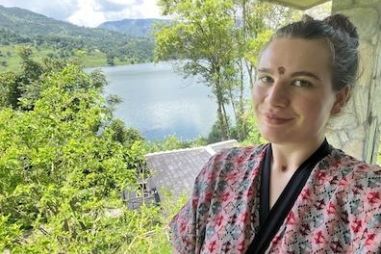Natural Recovery After Cancer with Ayurveda
Recovery after cancer often goes far beyond regaining physical strength. For many people, it is only then that the process of coming to terms with an intense period truly begins. Feelings of fear, uncertainty, and fatigue are often still very present, lingering just beneath the surface. Trust in one’s own body also needs time to be rebuilt. When medical treatment ends and you are declared ‘cancer-free,’ a new journey begins: learning to live again, giving the illness a place, and finding space for rest, confidence, and inner stability. Ayurveda can offer support in this process. It helps to rebuild energy and strength from within and contributes to emotional healing. In this way, the path opens to move forward and to shape life anew.
- What is Ayurveda?
- Why Ayurveda After Cancer?
- Key elements of Ayurvedic recovery:
- 1. Detoxification (Panchakarma)
- 2. Restoring the digestive fire (Agni)
- 3. Rejuvenation (Rasayana)
- 4. Emotional recovery
- 5. Nutritious meals and a healthy liifestyle
- Healing, step by step
- Review of a guests: Vivianne’s Experience
- Explore our Pachakarma offer
- Experience authentic Ayurveda retreats across Asia
- Discover all our Ayurveda Retreats holidays

What is Ayurveda?
Ayurveda means “knowledge of life” and is an ancient system of medicine from India, practiced for thousands of years. It is centered on creating balance between body, mind, and spirit. Every person has a unique constitution, called prakriti, which is determined by three energies: Vata, Pitta, and Kapha. When this balance is disturbed, health problems can arise. An Ayurvedic doctor therefore creates a tailored treatment plan based on your dosha type. A program may include herbal oil treatments, yoga, meditation, breathing exercises, herbs, and nourishing meals. Nutrition plays a key role: dishes are prepared with plenty of vegetables, herbs, and spices that match your dosha and are light to digest. In this way, Ayurveda helps to restore balance among the doshas and supports the body in healing on all levels. Worldwide, this holistic approach is increasingly recognized as a valuable complement to modern medicine.
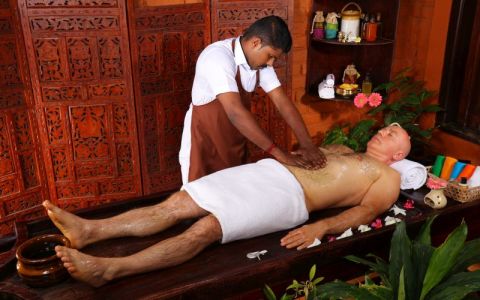
Why Ayurveda After Cancer?
After chemotherapy, the body is often left exhausted and fragile: the immune system is weakened, digestion slows down, and fatigue lingers. Beyond the physical effects, many people also face emotional burdens once the treatments are over. Ayurveda does not view these issues as separate symptoms, but as signs of a deeper imbalance in body, mind, and spirit. Through gentle support, Ayurveda helps the body rebuild strength from within and calms the mind. Nourishing meals restore digestion, herbal oil massages and therapies soothe the nervous system, and meditation creates inner stillness. Rather than forcing the body, Ayurveda provides the conditions for natural recovery.
Key elements of Ayurvedic recovery:

1. Detoxification (Panchakarma)
One of the first steps in Ayurvedic recovery is a gentle detox, known as Panchakarma. This series of treatments helps the body release toxins that have built up after illness or medical therapy. A tailored plan includes massages (in India and Sri Lanka often two to four per day), herbal steam baths, and oil therapies. These treatments are not only deeply relaxing but also support the liver and improve digestion.

2. Restoring the digestive fire (Agni)
In Ayurveda, a strong digestion – Agni – is seen as the foundation of our health. After cancer treatments, this digestive fire is often weakened. Herbs such as ginger, cumin, and trikatu are used to rekindle Agni, helping the body to absorb nutrients more effectively and support recovery.
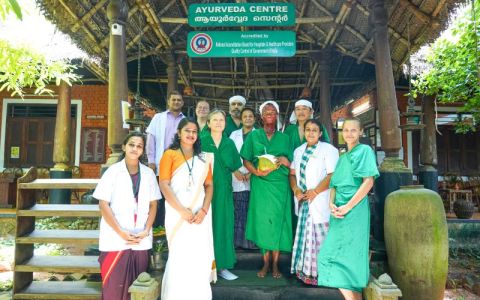
3. Rejuvenation (Rasayana)
Rasayana means ‘rejuvenation’. It focuses not on outward appearance, but on healing the body’s tissues and strengthening its inner defenses. In Western medicine, the immune system is seen mainly as protection against viruses and bacteria. Ayurveda, however, understands it more broadly - as the body’s ability to build resilience, conserve energy, and stay balanced. From this inner renewal comes strength, vitality, and lasting energy. Herbs like Ashwagandha, Guduchi, Shatavari, and Amalaki are traditionally used to support this process.

4. Emotional recovery
The diagnosis and chemotherapy often have a profound impact. Emotional recovery is therefore just as important as physical recovery. Meditation, breathing practices (pranayama), and gentle yoga help reduce stress and anxiety, improve sleep, and restore emotional balance. The entire treatment journey often leaves a lasting impression. Ayurveda supports the process of finding calm and rebuilding trust in the body.
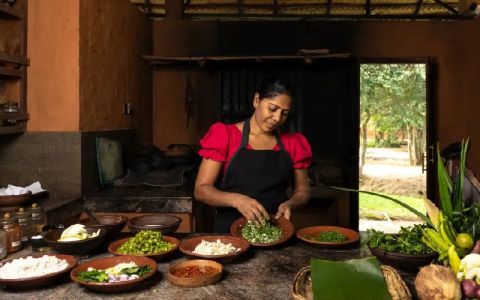
5. Nutritious meals and a healthy liifestyle
In Ayurveda, food is considered medicine. Nourishing, and easily digestible meals support recovery. Equally important is a regular daily rhythm: waking up, eating, and going to bed at fixed times. This helps calm the nervous system and keeps energy levels balanced.
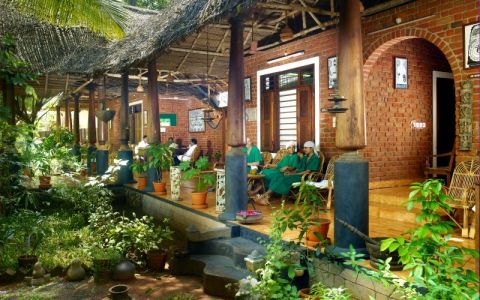
Healing, step by step
Ayurveda is not a replacement for conventional cancer treatment, but it can meaningfully support recovery afterwards. It helps reconnect with what illness and therapy have weakened: strength, calm, and resilience. The body holds a profound capacity for healing - Ayurveda helps bring that capacity to the surface. A Panchakarma program generally requires at least two weeks; shorter stays are usually less effective. The deepest expertise is found in India, Sri Lanka, and Nepal. Panchakarma retreats are also offered in Europe, though the treatments are often less extensive and the diet more adapted to Western habits.

Review of a guests: Vivianne’s Experience
Vivianne recovered from ovarian cancer after a year of surgery and chemotherapy. When the treatments ended, she longed to feel like herself again, but she was drained, with little energy, and struggled with digestive issues. 'It felt as if my body had lost itself', she recalls. 'During the treatments I was only focused on getting through. Once it was over, everything I had suppressed came flooding up at once. I didn’t know how to move forward. Simply picking up life again felt impossible. My loved ones were caring and supportive, but this was something I had to work through myself. I needed a place where I could rebuild my strength, restore my body, and, most of all, give space to my emotions.' She chose Sri Lanka and began a gentle three-week Panchakarma program under the guidance of an Ayurvedic team. 'The food was light and nourishing, the meditation and yoga helped me turn inward and face my emotions, and the daily treatments were deeply relaxing. Together, they gave me the strength to move forward and the peace to close this difficult chapter.'
Explore our Pachakarma offer
Experience authentic Ayurveda retreats across Asia
Discover all our Ayurveda Retreats holidays

About Marleen
This blog is written by Marleen, the founder of PureandCure.com in 2005. She travels around the world in search of the best Health & Wellbeing Hotels, Spas and Retreats and shares her know-how, experiences and observations through her blogs.

 EN
EN NL
NL BE
BE


